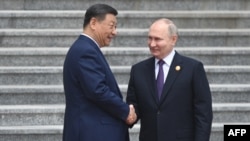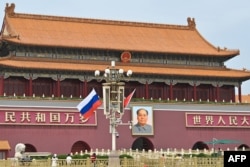Russian President Vladimir Putin concluded his two-day trip to China Friday after Beijing and Moscow reaffirmed their “strategic relationship” by signing a joint statement and vowing to cooperate against “destructive and hostile” pressure from Washington.
During meetings between Putin and Chinese President Xi Jinping, the Russian president said Moscow is willing to work with Beijing and other global south countries toward “a multipolar world,” while Xi said the two countries are committed to steering global governance “in the right direction.”
Some analysts say Putin and Xi are trying to emphasize that Beijing and Moscow’s close partnership “is a force for good in the global system.”
“Both leaders want to emphasize that they are creating a more equal environment and inclusive global economic and political system,” said Philipp Ivanov, a China-Russia analyst and the founder of consultancy Geopolitical Risks + Strategy Practice.
In addition to challenging the existing world order led by the United States, Putin and Xi criticized the U.S. and NATO for creating negative effects on regional peace and stability in the Indo-Pacific region by creating “closed and exclusive groupings” and expanding military presence.
“In the current geopolitical context, it is necessary to explore the establishment of a sustainable security system in the Eurasian space based on the principle of equal and indivisible security,” read the joint statement signed by Xi and Putin.
Some experts say Putin and Xi view Washington and NATO’s expanding military presence in Asia “as a zero-sum game.” “The logic of military balance is very central to their view of the international order and their target is the web of military alliances of the United States,” said Mathieu Duchatel, director of international studies at the French policy group Institut Montaigne.
He told VOA that one of Xi and Putin’s goals to uphold their partnership is to “undermine” Washington’s alliance networks in Asia.
Beijing’s limits
As Switzerland prepares to host a peace summit dedicated to the Ukraine war next month, Xi and Putin also exchanged views on that ongoing conflict during their meeting Thursday.
They believe that the war should be resolved through a political settlement. In a readout published by China’s state-run Xinhua News Agency, Xi said the fundamental solution to the war is establishing “a new, balanced, effective, and sustainable security architecture.”
He added that China supports an international peace conference “recognized by Russia and Ukraine at an appropriate time with equal participation and fair discussion of all options.”
Putin said Moscow “appreciates” Beijing’s “objective, just and balanced position on the Ukraine issue” and claimed that Russia is “committed to resolving the Ukraine issue through political negotiations.”
Ivanov said China’s current efforts to help resolve the Ukraine War, including a 12-point peace plan released last February, suggest Beijing is trying to avoid making any commitment. The peace plan “is a diplomatic document rather than any substantive strategy for China’s participation in resolving this war,” he told VOA.
Since neither Russia nor Ukraine is ready to negotiate, Ivanov thinks there is not much China can do to help end the war. “I haven’t seen any concrete steps from China in trying to resolve the war. I’m skeptical about Switzerland’s peace conference and China’s peace plan,” he said.
Lack of effective pressure on China
The meeting between Xi and Putin took place after Xi’s five-day trip to Europe, during which some analysts say Beijing was trying to exploit the disunity within the European Union.
It also follows repeated warnings from the United States about the potential consequences of Beijing’s ongoing support for Russia’s war against Ukraine.
During a news conference Thursday, U.S. State Department spokesperson Vedant Patel told journalists that China can’t support the Russian war efforts while simultaneously trying to improve relations with the West.
“It can't have it both ways and want to have [better] relationships with Europe and other countries while simultaneously continuing to fuel the biggest threat to European security in a long time,” he said.
Some experts say China’s decision to uphold its partnership with Russia reflects Beijing’s belief that the West’s warnings about potential sanctions against Chinese entities supporting Russia’s war efforts may not materialize.
“I think Beijing believes that there is nothing that Europe can do so they are asking Europe to show its hand,” Ja Ian Chong, a political scientist at the National University of Singapore, told VOA by phone.
In his view, the U.S. seems more serious about imposing potential secondary sanctions against Chinese entities while the European Union struggles to determine their responses to Beijing’s support for Moscow.
An upward trajectory of the partnership
Considering Washington’s repeated warnings of sanctioning Chinese entities for supporting Russia’s war efforts, Ivanov said Putin would try to safeguard Russia’s economic relationship with China through his visit.
“I’m pretty confident that there is an active discussion on how to circumvent sanctions, and we will probably see more transactions and import-export activities flowing through third countries, such as those in Central Asia,” he told VOA, adding that one of China and Russia’s goals is to build a geoeconomic system “that is immune from Western sanctions and export controls.”
Despite Western countries’ attempts to pressure or persuade China to stop support for Russia, Ivanov and Duchatel say Beijing will continue to uphold its partnership with Moscow.
“There is no sign that Russia’s access to Chinese dual-use technology has been seriously reduced, and no actions from China suggest a reduced commitment to supporting Russia,” Duchatel told VOA.
Ivanov said while there might be some disagreements between China and Russia, the overall direction of their partnership is “trending upward.” “I don’t think the U.S. or Europe can substantively influence the course of the China-Russia partnership at the moment,” he said.







